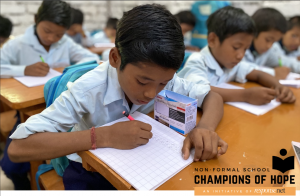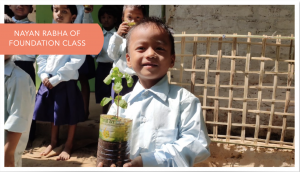Quality Education | NGO | CSR
Empowering India’s Future: CSR for Education
Why Education Needs Corporate Support
The Education Gap in India: Key Statistics
- 17% of students drop out before completing primary education
- 37% dropout rate at the secondary level
- Overall literacy rate: 77.7%
- Literacy rate in marginalized communities: Below 50%
Rural vs. Urban Divide: Only 65% of children in rural India complete their education compared to 85% in urban areas.
Latest Education Statistics
How Corporations Can Contribute
Adopt a School
Sponsor Teacher Training
Fund Scholarships
Provide EdTech Support
Partner for Vocational Training
Join the Movement: Transform Education with Your CSR Contributions
Let’s build a future where every child has access to quality education!
📩 Contact Us: [email protected] | 📞 Call: +91-9810007524
Make an Impact Today!
Source: For the most up-to-date:
-
UDISE+ Official Portal: https://udiseplus.gov.in
-
NAS Reports (NCERT): https://nas.education.gov.in
-
Ministry of Education, India: https://www.education.gov.in
Why Education Needs Corporate Support
The Education Gap in India: Key Statistics
- Dropout rates: 17% of students drop out before completing primary education; this rises to 37% at the secondary level.
- Literacy Rate Disparities: While India’s overall literacy rate stands at 77.7%, the rate drops below 50% in marginalized communities.
- Rural vs. Urban Divide: Only 65% of children in rural India complete their education compared to 85% in urban areas.
Latest Education Statistics from UDISE+ & NAS 2023-24
Enrollment Trends
- Overall Enrollment: The Gross Enrollment Ratio (GER) has improved across all levels:
- Primary (Grades 1-5): 104.5% (an increase from 102.7% in 2022)
- Upper Primary (Grades 6-8): 92.1%
- Secondary (Grades 9-10): 79.8%
- Higher Secondary (Grades 11-12): 57.6% (still a challenge in rural areas)
- Government vs. Private Schools:
- Government schools saw an increase in enrollment, now covering 72% of total students, compared to 69% in 2022.
- Private school enrollment dropped slightly due to increased investments in public education and affordability concerns.
Pre-School Enrollment
- Anganwadi & Pre-Primary Enrollment:
- Increased to 82% of children aged 3-5 enrolled in early education programs.
- Government initiatives like Poshan Abhiyan & National Education Policy (NEP) 2020 have helped boost participation.
- States with the highest pre-school enrollment: Kerala, Tamil Nadu, Himachal Pradesh.
- Challenges in Uttar Pradesh, Bihar, and Jharkhand, where access remains limited.
Foundational Literacy & Numeracy (FLN)
- Reading Skills:
- 47% of Grade 3 students can read Grade 1-level text (NAS 2023).
- Only 52% of Grade 5 students can read a Grade 2-level text, reflecting learning gaps.
- Numeracy Levels:
- Grade 3: 39% of students could do basic subtraction.
- Grade 5: Less than 45% could perform division.
Gender Disparities in Education
- Girls’ Enrollment: Female enrollment in secondary education increased to 77%, but dropout rates still persist in rural areas.
- Performance Gap: Girls continue to outperform boys in literacy, while boys have a slight edge in numeracy.
- Barriers to Education: Socioeconomic factors and safety concerns contribute to higher dropout rates among adolescent girls.
Regional & Rural-Urban Disparities
- States with Strong Education Indicators: Kerala, Tamil Nadu, Himachal Pradesh, Maharashtra.
- States Struggling with Learning Outcomes: Bihar, Uttar Pradesh, Madhya Pradesh, Jharkhand.
- Rural-Urban Divide:
- Urban students score 15-20% higher than their rural counterparts in NAS assessments.
- Over 30% of rural students lack access to secondary schools within 5 km.
Impact of EdTech & Digital Learning
- Smartphone & Internet Access:
- Only 26% of rural students have access to a smartphone for learning.
- In urban areas, 74% have access to digital learning tools.
- Government Initiatives:
- PM eVIDYA & DIKSHA portal usage increased, benefiting over 35 million students.
- Digital disparities persist in rural and low-income communities.
Infrastructure & Teacher Training
- School Facilities:
- 92% of schools have drinking water, but only 78% have functional toilets.
- Digital infrastructure remains poor in Tier 3 and rural areas.
- Teacher Training & Availability:
- 18% of schools lack trained teachers, particularly in rural and tribal belts.
- Government aims to recruit 1.5 million teachers under NEP 2020 reforms.
Dropout Rates (UDISE+ 2023)
- Primary Level (Grades 1-5): 2.6% dropout rate (reduced from 3.2% in 2022).
- Upper Primary (Grades 6-8): 3.9%, showing improvement due to mid-day meal schemes and incentives.
- Secondary Level (Grades 9-10): 14.6%—high dropout due to financial constraints and early marriage in some regions.
- Senior Secondary (Grades 11-12): 27.6%—significant concern, with affordability and lack of higher education opportunities being key factors.
- States with Highest Dropout Rates: Bihar, Jharkhand, Madhya Pradesh, Uttar Pradesh, and Odisha.
- Major Reasons: Poverty, gender-based barriers, lack of secondary schools in rural areas.
Budget Allocation for Education (Union Budget 2023-24)
- Total Education Budget: ₹1.12 lakh crore (approx. $13.5 billion).
- Increase from Last Year: 8% rise in funding compared to 2022-23.
- Key Allocations:
- Samagra Shiksha Abhiyan: ₹37,453 crore for universal education.
- PM Schools for Rising India (PM SHRI): ₹4,000 crore for modernizing 14,500 schools.
- Teacher Training & Digital Infrastructure: ₹5,200 crore.
- Mid-Day Meal (PM Poshan): ₹11,600 crore.
The Budget Allocation for the FY 2025-26 of ₹ 78572 Cr is the highest ever for the Department of School Education & Literacy. There has been an overall increase of ₹ 5074 Cr (7%) in the Budget Allocation of Department of School Education and Literacy in the FY 2025-26 from BE 2024-25.
- The Budget Allocation for the FY 2025-26 of ₹ 78572 Cr is the highest ever for the Department of School Education & Literacy.
- There has been an overall increase of ₹ 5074 Cr (7%) in the Budget Allocation of Department of School Education and Literacy in the FY 2025-26 from BE 2024-25. As compared to RE of FY 2024-25, there has been an increase of ₹ 11,000 Cr (16.28 %).
- The highest ever Budget Allocation may be seen in the Autonomous Body of Kendriya Vidyalaya Sangathan (KVS) at Rs. 9,503 Cr. Allocation in KVS has increased by ₹ 201.17 Cr as compared to Budget allocation of FY 2024-25. There has been an increase of ₹ 776 Cr (9%) as compared to RE of FY 2024-25.
- Budget Allocation of FY 2025-26 in Flagship Schemes have increased i.e Samagra Shiksha (by ₹ 3750 Cr), PM-POSHAN (by ₹ 32 Cr) and PM-SHRI (by ₹ 1450 Cr) with respect to Budget Allocation (BE) of FY 2024-25. As compared to RE 2024-25, allocation in Samagra Shiksha has increased by ₹ 4240 Cr (11%), allocation in PM-POSHAN has increased by ₹ 2500 Cr (25 %) and allocation in PM-SHRI has increased by ₹ 3000 Cr (66%).
- Out of the overall Budget Allocation in FY 2025-26 of ₹ 78,572 Cr, the Scheme allocation is ₹ 63,089 Cr and Non-Scheme Allocation is ₹ 15,483 Cr.
- Increase in Scheme Allocation in BE 2025-26 is ₹ 5284 Cr (9.14 %) as compared to BE 2024-25. As compared to RE 24-25, increase in Scheme Allocation is ₹ 10248 Cr (19%) and non-Scheme allocation has increased by ₹ 752 Cr (5%) in BE 2025-26.
- Fifty thousand (50,000) Atal Tinkering Labs (ALT) will be set up in Government schools in next five years to cultivate the spirit of curiosity and innovation, and foster a scientific temper among young minds.
- Broadband connectivity will be provided to all Government secondary schools under BharatNet project in the next three years.
Department of Higher Education, Ministry of Education
- The overall Budget Allocation in FY 2025-26 is Rs. 50077.95 Cr out of which Scheme allocation is Rs. 6990.88 Cr and Non- Scheme allocation is Rs. 43087.07 cr.
- There has been an overall increase of Rs. 2458.18 Cr (5.16%) in the Budget Allocation of Department of Higher Education in the FY 2025-26 with respect to FY 2024-25.
Teacher Vacancies & Training (UDISE+ 2023)
- Total Teacher Shortage: 1.3 million vacancies, with highest shortages in Bihar, Jharkhand, and Uttar Pradesh.
- Pupil-Teacher Ratio (PTR): National average at 26:1, but 40:1 in rural states—above the recommended 30:1.
- Untrained Teachers: 17% of government school teachers lack proper training.
- EdTech-Based Teacher Training: Government initiatives (like DIKSHA) have trained over 1.5 million teachers on digital platforms.
Infrastructure Gaps in Schools
- Schools Without Functional Toilets: 22% lack girls’ toilets, contributing to female dropouts.
- Drinking Water Availability: 88% of schools have drinking water, but only 65% have potable water.
- Electricity Access: Only 56% of rural schools have electricity, affecting digital learning.
- Smart Classrooms & Digital Access: Less than 25% of government schools have functional smart classes or computers.
Higher Education & Employability
- Gross Enrollment Ratio (GER) in Higher Education: 27.3% (targeting 50% by 2035 under NEP 2020).
- Skill Gaps: 60% of youth in rural India lack employability skills despite formal education.
- NEP 2020 Impact: Focus on multidisciplinary courses, digital universities, and skill-based learning.
Key Takeaways for CSR activities in education & Policy Action
- Urgent FLN Interventions: Strengthen literacy & numeracy skills for early graders.
- Support Digital Inclusion: Expand internet and smart device access in rural schools.
- Improve Infrastructure: Focus on sanitation, classrooms, and teacher training.
- Gender-Sensitive Interventions: Encourage secondary education for girls through scholarships and community engagement.
Geographical Disparities: Where the Need is Greatest
High Priority States: Bihar, Jharkhand, Uttar Pradesh, Rajasthan, and Madhya Pradesh account for over 50% of out-of-school children.
- Bihar & UP: Less than 10% of schools have access to digital learning tools.
- North-East India: Infrastructure gaps—lack of trained teachers, poor facilities.
- Urban Slums: Only 1 in 3 slum children attend schools regularly.
- Tribal Regions: Literacy rates below 40% due to limited school access.
Non-Formal Schools: A Solution for Inclusive Learning
What Are Non-Formal Schools?
Non-formal schools bridge the gap for out-of-school children, dropouts, and marginalized youth who face barriers to mainstream education. These schools operate in community spaces, shelters, and informal setups with customized learning approaches.
Why Non-Formal Schools Work:
- Flexible Learning: Allows children from working-class families to attend classes.
- Localized Curriculum: Addresses community-specific education needs.
- Skill-Based Training: Vocational education to improve employability.
- Low-Cost & High-Impact: Requires 50% less funding than formal schools.
CSR Success Stories
✅ Microsoft’s Digital Literacy Initiative – Children gain access to online education.
✅ AON’s Champions of Hope – Educating migrant children in Gurugram.
Why CSR Investment in Education Matters
Examples of How Corporations Can Contribute through CSR for activities in education
💡 Adopt a School: Support the infrastructure, teachers, and digital learning tools.
💡 Sponsor Teacher Training:Empower educators to improve learning outcomes.
💡 Fund Scholarships: Enable meritorious students from marginalized backgrounds.
💡 Provide EdTech Support: Equip classrooms with smart learning tools.
💡 Partner for Vocational Training: Improve youth employability through skill-building programs.
Join the Movement: Transform Education with Your CSR Contributions
Let’s build a future where every child has access to quality education!
📩 Contact Us: [email protected] | 📞 Call: +91-9810007524
Make an Impact Today!
The Champions of Hope – Non-Formal Education Program strives for quality education and to ensure that deprived children and youth receive the opportunity to build their dreams.
We work with partners to ensure that no children are left behind and are too far to receive an education that will help bring out the best in them and enable them to achieve their full potential.



